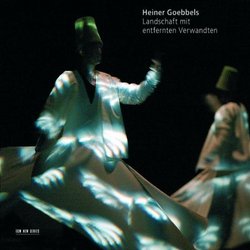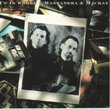A sprawling postmodern anti-war opera
R. Hutchinson | a world ruled by fossil fuels and fossil minds | 01/18/2010
(3 out of 5 stars)
"Heiner Goebbels seems to have hit his stride in the new millennium, producing a steady stream of cutting edge works of music theater. Based on his website, his live stage productions have run well out ahead of ECM's capability to record and release them. I don't find this, the latest to be recorded, "Landschaft mit entfernten Verwandten" (LANDSCAPE WITH DISTANT RELATIVES) to be nearly as compelling as EISLERMATERIAL (see my review), the 2002 ECM release. But whereas the stage element of Eislermaterial was minimal, this new work includes elaborate staging. It is the first of Goebbels's works that he has labeled an opera, though it is certainly not a conventional opera. The point is that as is often the case with works of music theater, much is lost with an audio-only recording. Based on the beautiful still color photos included in the ECM booklet, LANDSCAPE would be much more compelling experienced with the visuals and stage action. It should be released on DVD! What we have here is a live recording from a Paris performance in October 2004.
The music is performed by the Ensemble Modern and the Deutsche Kammerchor with Franck Ollu conducting. Texts come from Gertrude Stein, Giordano Bruno (who was burned at the stake in Rome as a heretic), Henri Michaux, T.S. Eliot, Leonardo da Vinci and Nicolas Poussin. Frustratingly, I have failed thus far to obtain English translations of the French, Italian and German texts. However, the central thread running through is a series of excerpts from Stein's 1945 "Wars I Have Seen," a droll, caustic commentary on the destruction of war. There is also a lengthy extract from Eliot's 1952 "Coriolan," which complements Stein perfectly. These English passages provide some sense of meaning for the monolingual among us. The Stein is read by a charming Englishwoman.
The narrative is disjointed and suggestive, and the music is accessible, drawing on popular forms rather than a dense postserialist sound. The "Tanz der Derwische" (Dance of the Dervishes) must be something to behold live on stage, and, appearing as the 6th track of 27, seems to indicate that the Muslim world figures prominently among the distant relatives on the landscape. Given this, the wars constantly referred to would seem to be the 21st century wars against fearsome Oriental Others, in the context of the European wars of the 20th century. Track 20 features a recording of shells exploding with string quartet. Many of the scenes in the booklet depict oh-so-civilized early Moderns of the Renaissance and perhaps Baroque eras, forerunners of our epoch.
I would love to see this production live, and I applaud Goebbels, the Ensemble Modern and all the others involved in its creation. But without the stage visuals, much is lost. The music is not complex enough to be compelling on its own. Please, ECM, make Heiner Goebbels's creations available on DVD!
If you enjoy contemporary operas, you may find my list of interest: LATE 20TH/21ST CENTURY AVANT OPERAS.
"


